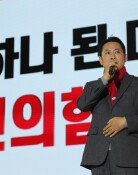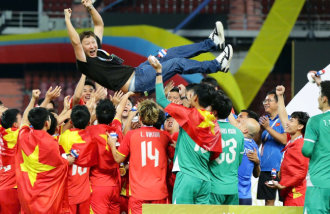Unification Ministry Set for Shutdown
Unification Ministry Set for Shutdown
Posted January. 17, 2008 07:22,
The core of government restructuring planned by the incoming administration is the proposed absorption of the Unification Ministry by the Foreign Affairs and Trade Ministry.
The functional discretion of what will be called the Foreign Affairs and Unification Ministry will be expanded, as the new body will serve as the control tower for national security and foreign affairs.
The transition committee of President-elect Lee Myung-bak hotly debated to the last minute whether to keep the Unification Ministry. The liberal camp including the United New Democratic Party are threatening to block passage of the bill on the merger, creating a gloomy outlook for the move.
▽ Creation of Foreign Affairs and Unification Ministry
Park Jae-wan, a committee member in charge of deregulation, defended the abolition of the Unification Ministry yesterday.
Inter-Korean exchanges and economic cooperation are no longer under the sole discretion of a particular agency, he said. Its an agenda that the entire government should pursue. Its time to refocus the functions of the ministry on promotion of economic exchanges and dialogue between the two Koreas.
The committee said more efficient implementation of unification policies will come after the two ministries unite.
Once the Unification Ministry is shut down, each provincial government will supervise support for North Korean defectors, while the Knowledge and Economy Ministry and the Homeland and Marine Affairs Ministry will handle inter-Korean economic cooperation. In addition, the National Intelligence Service will conduct intelligence operations and analysis of the North Korean government.
Thus provincial authorities will run halfway houses for North Korean defectors, and intelligence officials will assess and analyze information obtained through North Korean media.
The presidential office of Cheong Wa Dae opposed the Unification Ministrys shutdown. Presidential spokesman Cheon Ho-seon said, Weve reached a critical moment of resolving North Koreas nuclear program and promoting inter-Korean harmony and cooperation.
We have to induce and manage change in the North. At this critical point, its regrettable to abolish the ministry.
Former Unification Minister Chung Dong-young also voiced displeasure with the move, saying, It is deplorable to abolish the Unification Ministry. The decision to do so reflects the philosophy of the new administration and its lack of understanding of the Korean Peninsula.
Committee member Park ruled out a possible restoration of the ministry for political concessions, saying, Our decision has no hidden intent. We will not trade anything for revival of the ministry with the United New Democratic Party.
▽ Reinforced Foreign Affairs and Unification Ministry
The proposed Foreign Affairs and Unification Ministry will perform normal diplomatic operations in addition to tasks previously carried out by the Unification Ministry. The new administration will also abolish the presidential secretariat in charge of unification and foreign affairs policy. Thus the new ministry will serve as a command center for all diplomacy.
The presidential office has been in charge of policy coordination among agencies on foreign affairs and national security, with assistance mainly having come from the Foreign Ministry. The merged ministry, however, is likely to take up that role and probably create a sub-agency for North Korea policies. It is also likely to retain one more deputy minister.
▽ History of Unification Ministry
The prototype of the Unification Ministry debuted in March 1969, with 45 staff members headed by a minister-level senior official and four sub-organizations. In 1980, it was made into an official ministry to supervise official inter-Korean communication, a role which it received from the intelligence agency. In December 1990, the ministry took on the additional duties of coordinating unification policy and supervising cooperative programs. The unification minister was also promoted to deputy prime minister. When President Kim Dae-jung took office in 1998, he reorganized the ministry.
Chung and Lee Jong-seok each served as unification minister under the Roh Moo-hyun administration. The ministry has seven sub-agencies and 550 staff members on its payroll.
mhpark@donga.com







